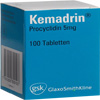Kemadrin
 Kemadrin is used to treat the stiffness, tremors, spasms, and poor muscle control of Parkinson's disease by reducing the effects of certain chemicals in your body.
Kemadrin is used to treat the stiffness, tremors, spasms, and poor muscle control of Parkinson's disease by reducing the effects of certain chemicals in your body.
Active Ingredient: procyclidine
Availability: In Stock (113 packages)
Kemadrin, 5mg
| Package | Per Pack | Order | |
|---|---|---|---|
| 20 pills x 5mg | £1.57 | £31.30 | |
| 30 pills x 5mg | £1.27 |
|
|
| 60 pills x 5mg | £0.98 |
|
|
| 90 pills x 5mg | £0.88 |
|
|
| 180 pills x 5mg | £0.78 |
|
|
270 pills x 5mg
Free airmail shipping |
£0.75 |
|
|
360 pills x 5mg
Free airmail shipping |
£0.74 |
|
Product Description
Packaging
Kemadrin (Procyclidine)
General information
Kemadrin belongs to a class of medication called anticholinergics that work by blocking a certain natural substance (acetylcholine). This helps decrease muscle stiffness, sweating, and the production of saliva, and helps improve walking ability in people with Parkinson's disease. Kemadrin is used to treat symptoms of Parkinson's disease or involuntary movements due to the side effects of certain psychiatric drugs (antipsychotics such as chlorpromazine or haloperidol).
Directions
Take Kemadrin exactly as prescribed by your doctor. For treatment of Parkinson's disease the recommended starting dose is 2.5 mg three times daily (after meals). Your doctor may increase your dose to 5 mg three times daily (after meals) or even four times daily (after meals and at bedtime). For treating extrapyramidal symptoms the recommended starting dosage is 2.5 mg three times daily (after meals). Your doctor will increase your dose as necessary. Most people do well with a dose of 10 mg to 20 mg total per day. Take each dose with a full glass of water. Take it at the same times each day.
Precautions
Before taking Kemadrin you should talk with your doctor if you have enlarged prostate (benign prostatic hyperplasia), psychosis, schizophrenia, glaucoma, rapid heart rate (tachycardia), difficulty passing urine, tardive dyskinesia, alcohol problem, blockage of the bladder, muscle disease, mental or mood problems, any allergies. This drug may make you dizzy or drowsy or cause blurred vision. Do not drive or perform tasks that require alertness. Avoid alcoholic beverages. It may increase drowsiness and dizziness. Avoid becoming overheated.
Contraindications
You should not take Kemadrin if you are allergic to it, procyclidine hydrochloride, or any of the inactive components of this medication, or if you have angle closure glaucoma. Let your doctor know if you are pregnant or breastfeeding.
Possible side effect
Get emergency medical help if you have difficulty breathing, closing of your throat, hives, swelling of your lips, tongue, or face, unusual fever, fast or irregular heartbeat, anxiety, hallucinations, confusion, hyperactivity, or loss of consciousness, agitation, disorientation, unusual behavior, seizures, eye pain, rash, dry mouth, large pupils, blurred vision, drowsiness, difficulty urinating, constipation, upset stomach, decreased sweating. If you notice other effects not listed above, contact your doctor.
Drug interactions
Tell your doctor about all other medications you use, especially: tricyclic antidepressants (doxepin, amitriptyline, clomipramine), phenothiazine, acetylcholinesterase (rivastigmine, tacrine, galantamine), pramlintide, antiarrhythmics (disopyramide, procainamide, quinidine), amantadine, digoxin, haloperidol, antihistamine (diphenhydramine, clemastine, brompheniramine), corticosteroids (prednisone), monoamine oxidase inhibitors (furazolidone, isocarboxazid, linezolid), narcotic pain relievers (meperidine). Interaction between two medications does not always mean that you must stop taking one of them. Tell your doctor about all prescription, over-the-counter, and herbal medications you are taking.
Missed dose
Take the missed dose as soon as possible. Skip the missed dose if it is time for your next scheduled dose. Don't take extra medicine to make up the missed dose.
Overdose
If you think you have overdosed the medicine seek emergency medical help at once. The overdose symptoms are fast or slow heartbeat, slow or shallow breathing, unconsciousness, seizures, loss of coordination, fever, dry skin, widened pupils, change in vision, change in the amount of urine, confusion, hallucinations, headaches, nausea, vomiting, dry mouth, nervousness, muscle weakness, glaucoma, high blood pressure (hypertension), rapid heart rate (tachycardia).
Storage
Store the medicine at room temperature between 59-77 degrees F (15-25 degrees C) away from light and moisture. Do not store the drugs in the bathroom. Keep all drugs away from reach of children and pets.
Note
The information presented at the site has a general character. Note please this information cannot be used for self-treatment and self diagnosis. You should consult with your doctor or health care adviser regarding any specific instructions of your condition. The information is reliable, but we concede it could contain mistakes. We are not responsible for any direct, indirect, special or other damage caused by use of this information on the site and also for consequences of self-treatment.
Packaging info
This is how your parcel will look like, the images are photographs of real shipments.
It has the size of a normal protected envelope and it does not disclose its contents.









